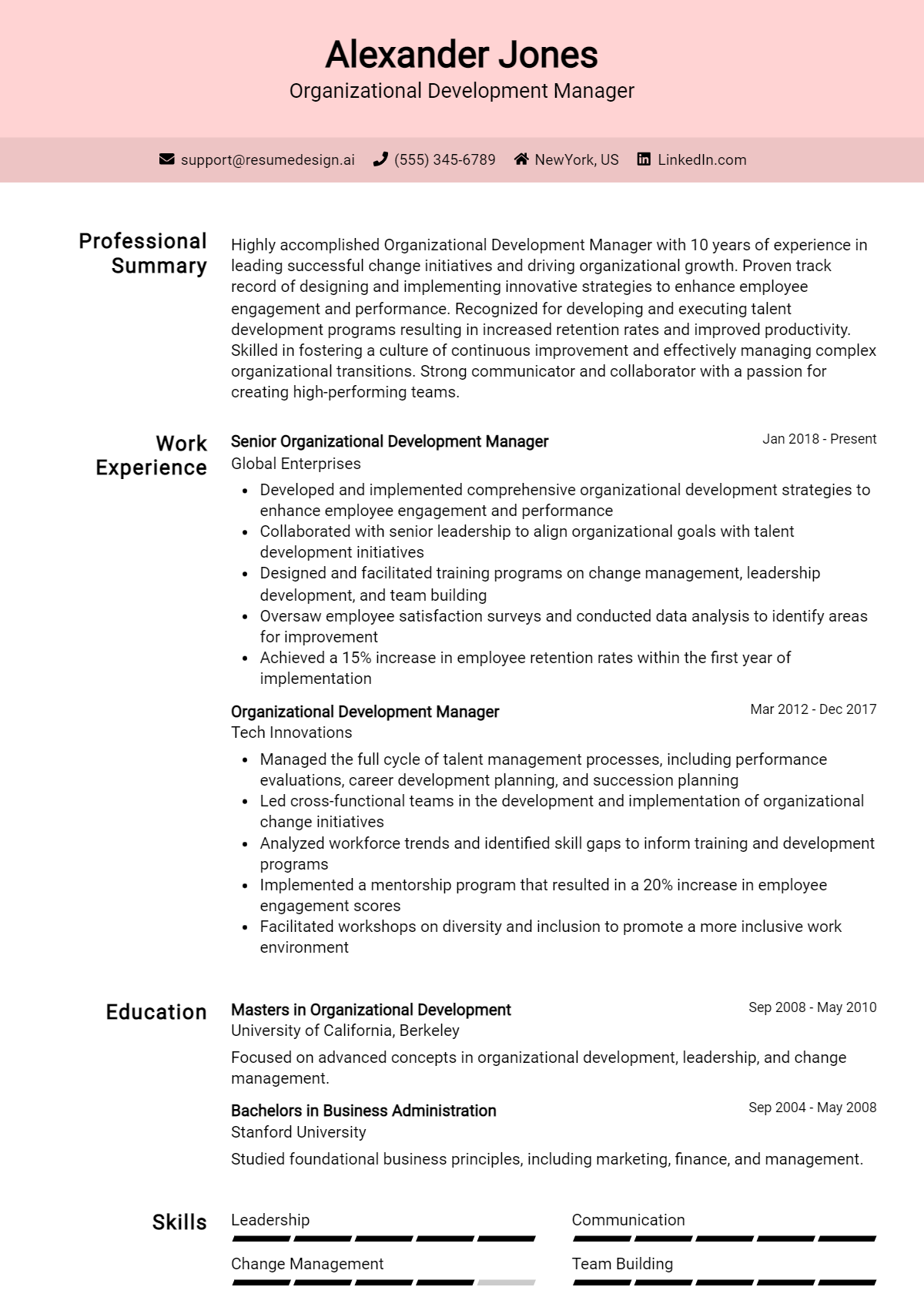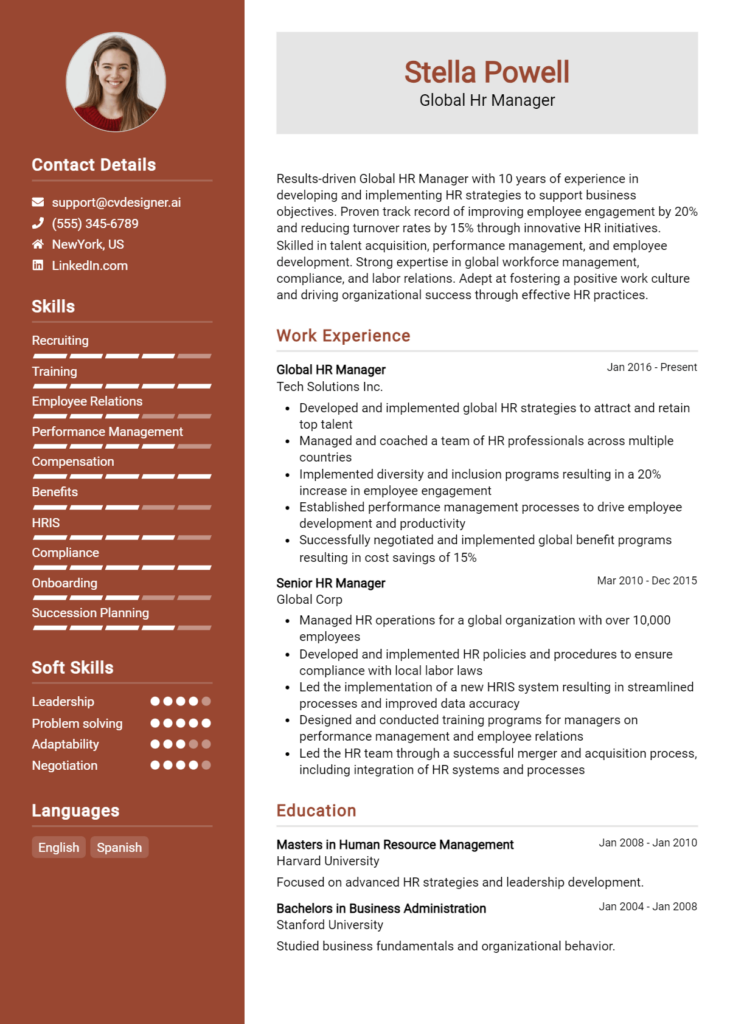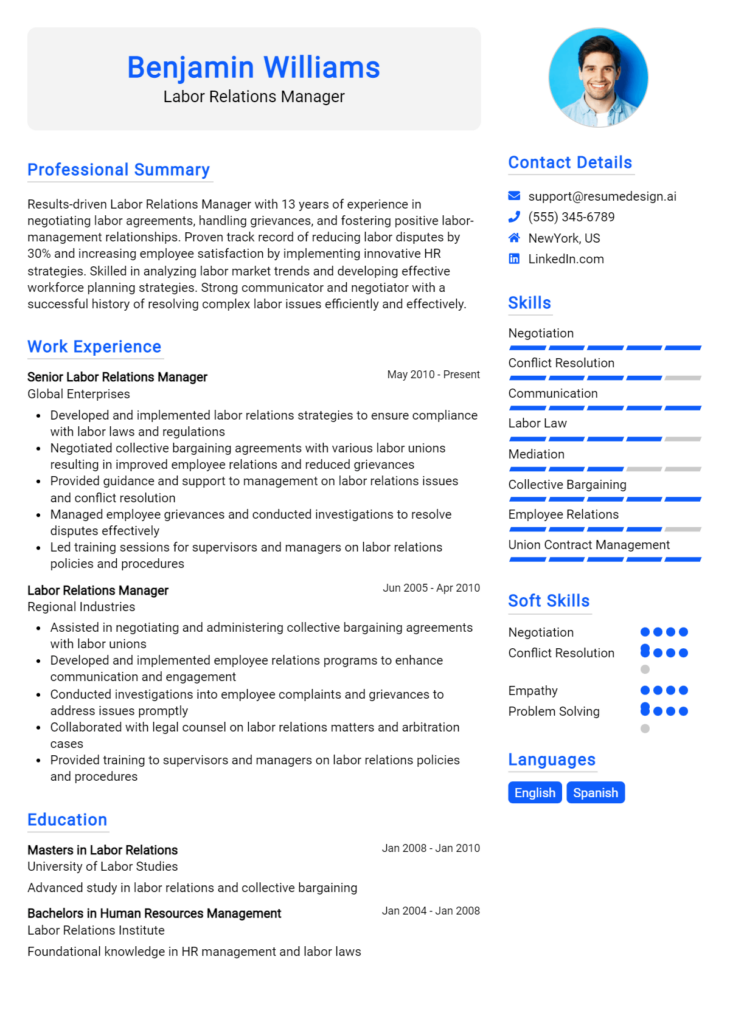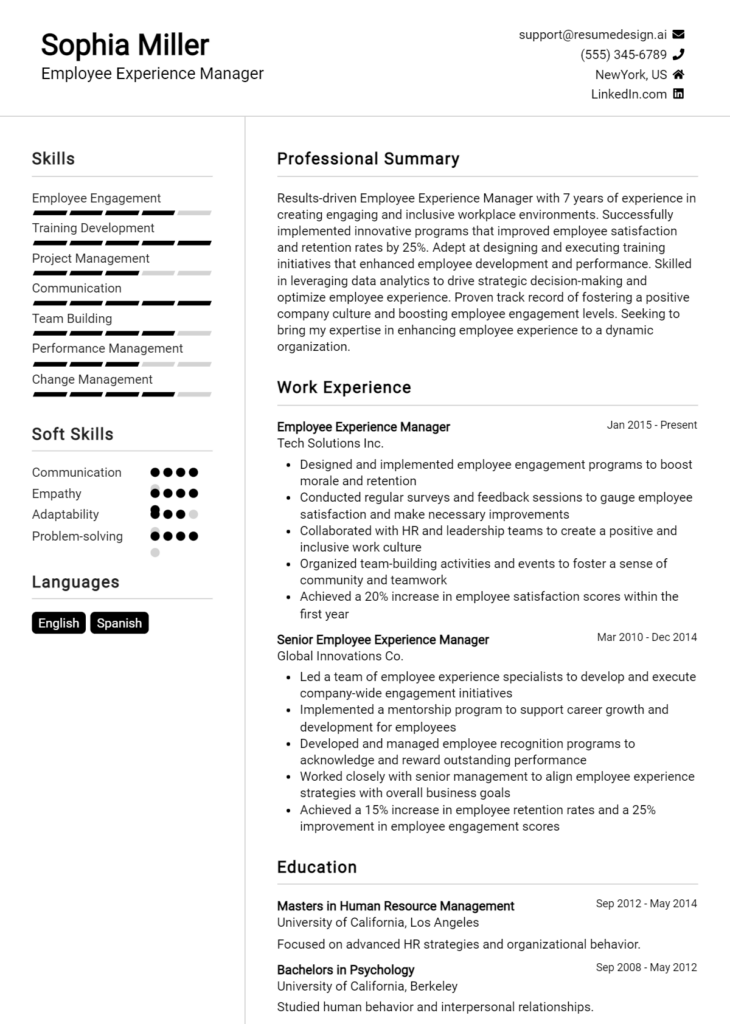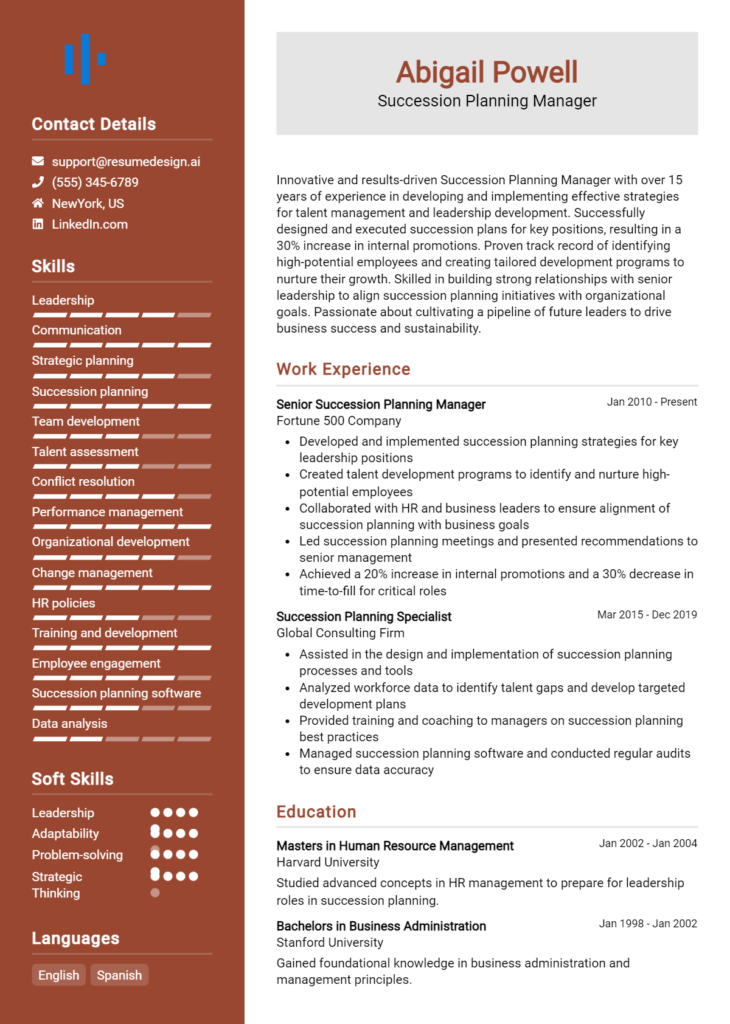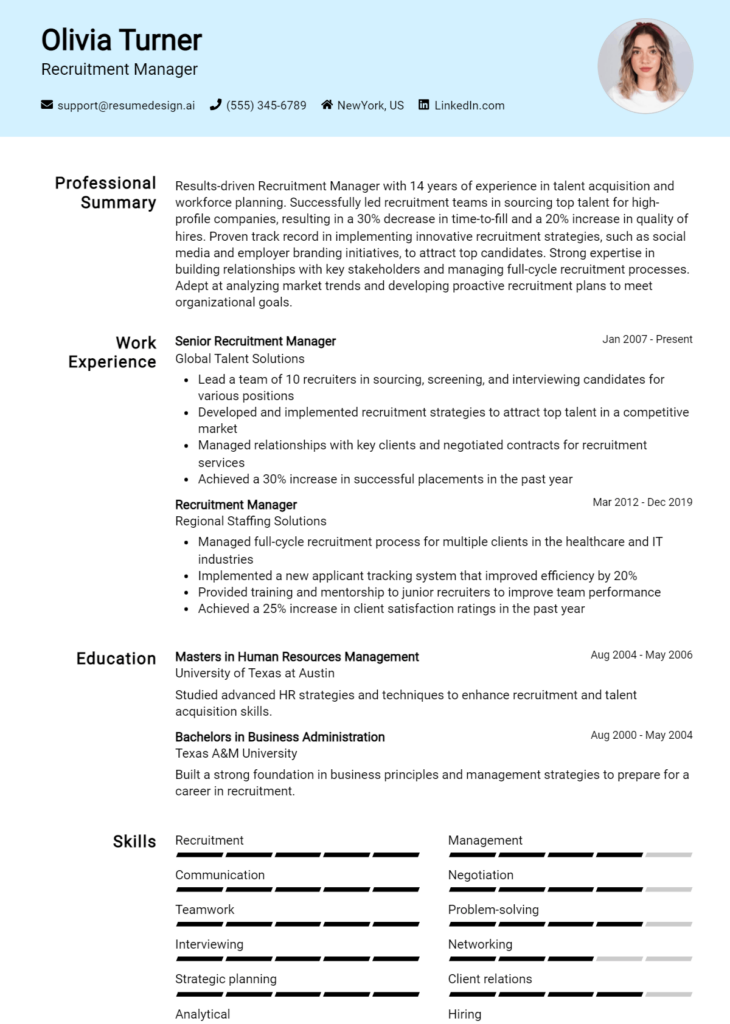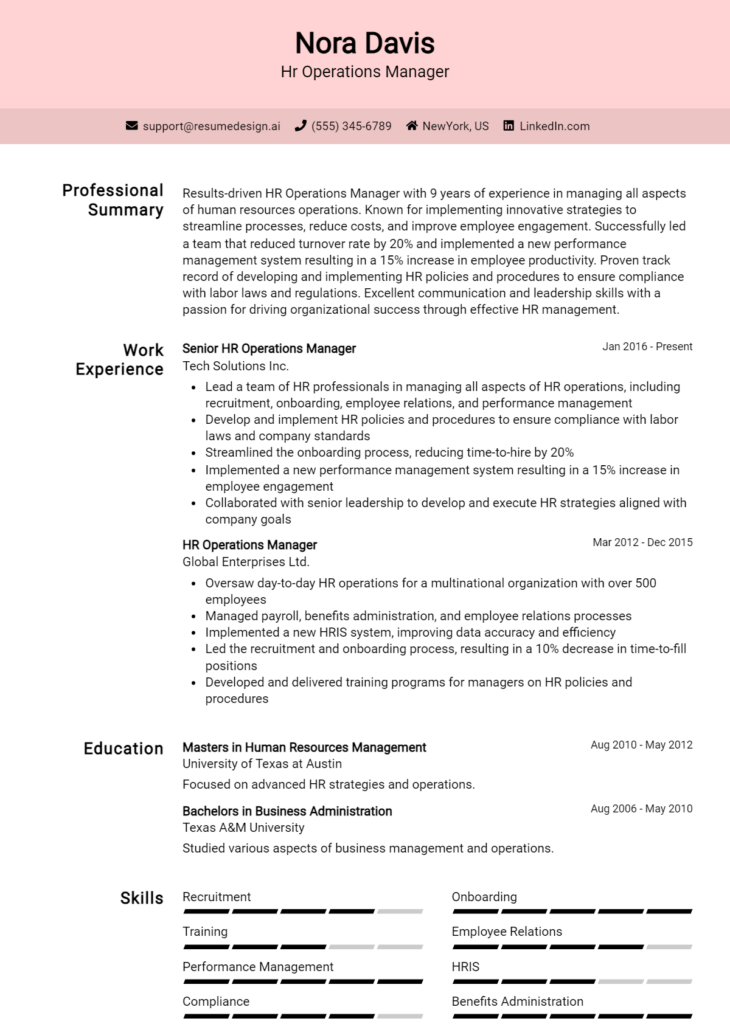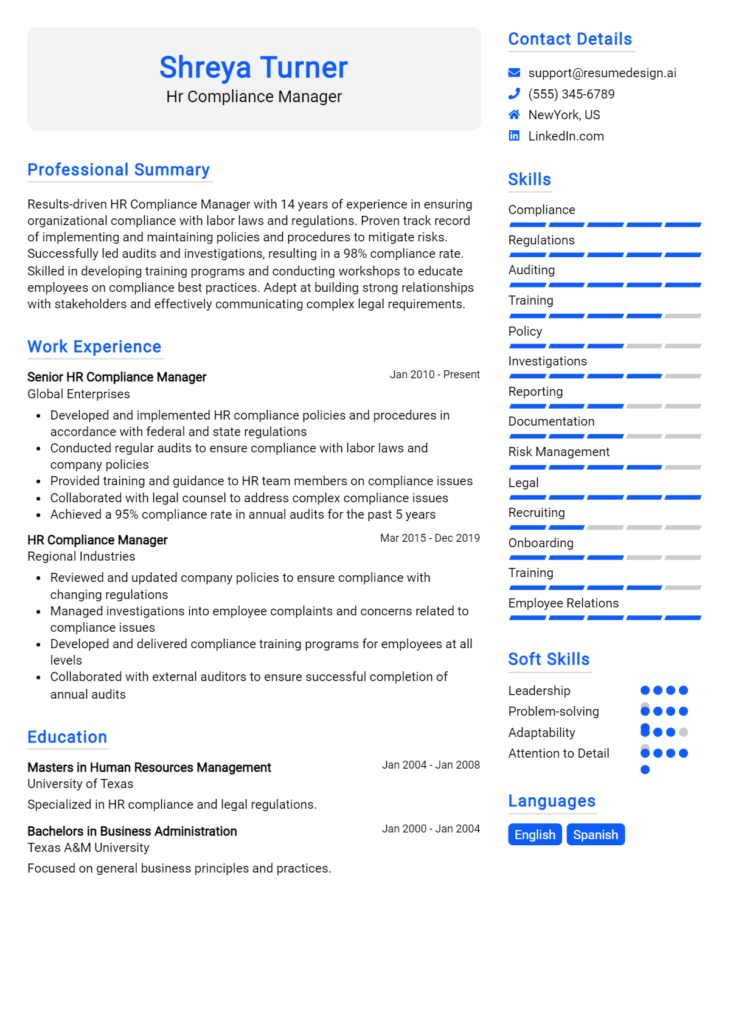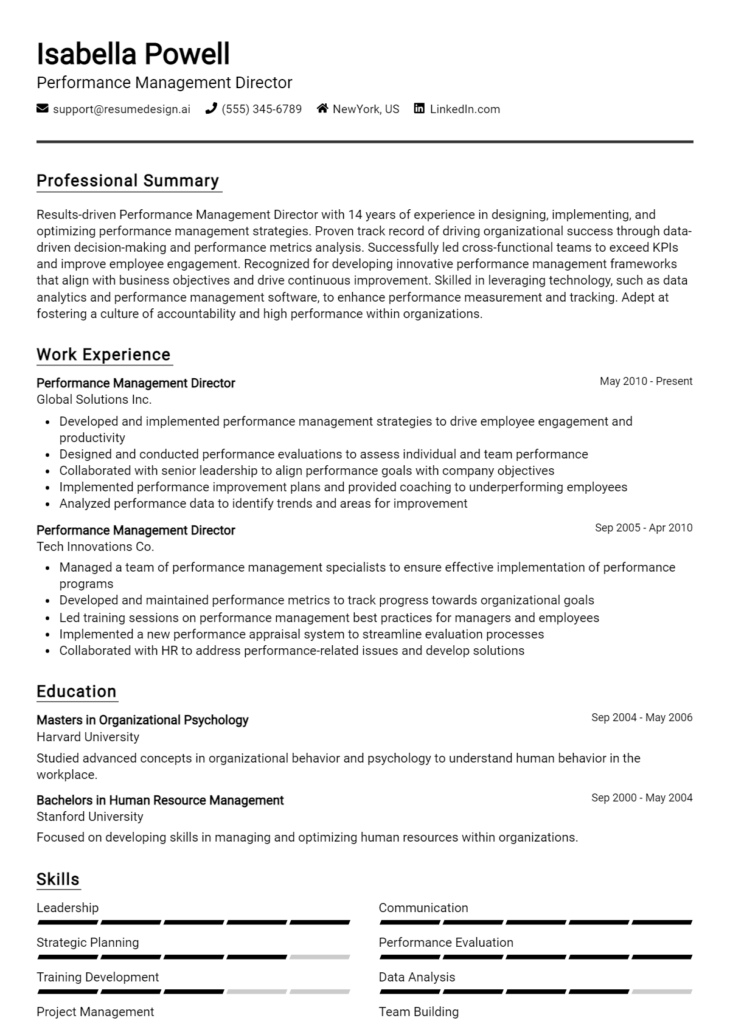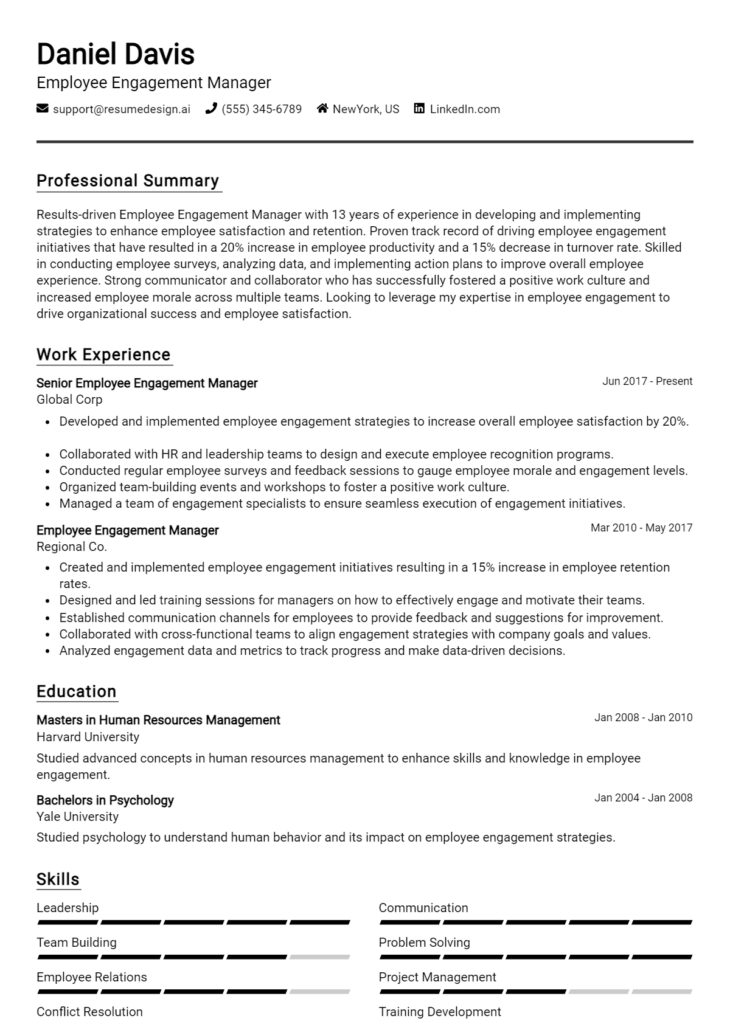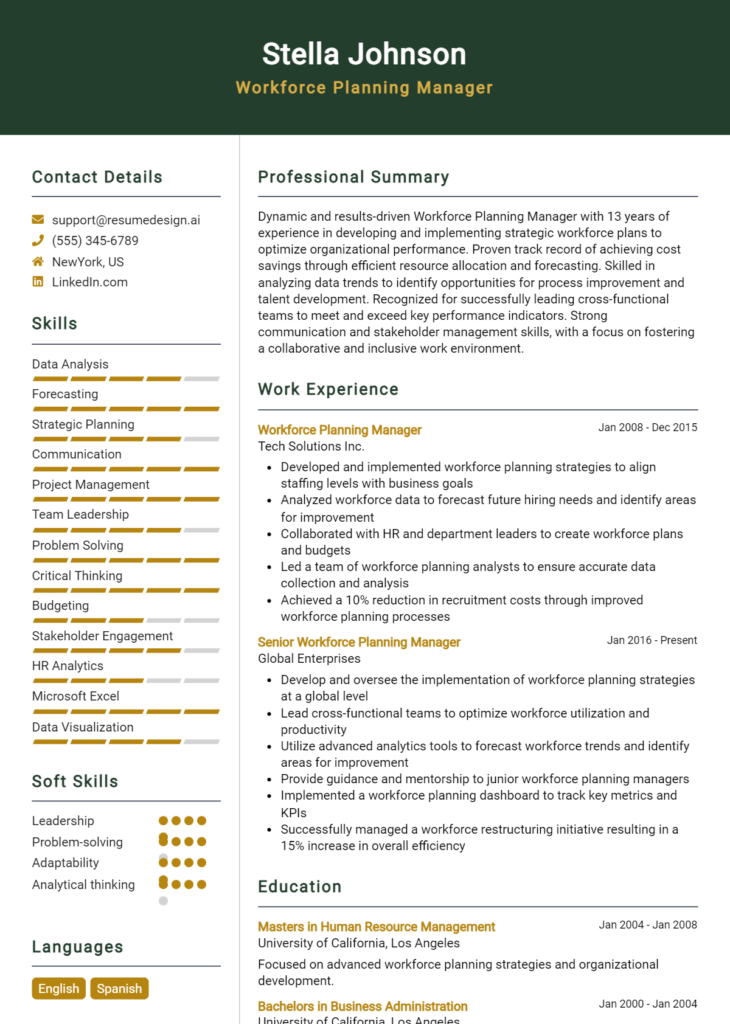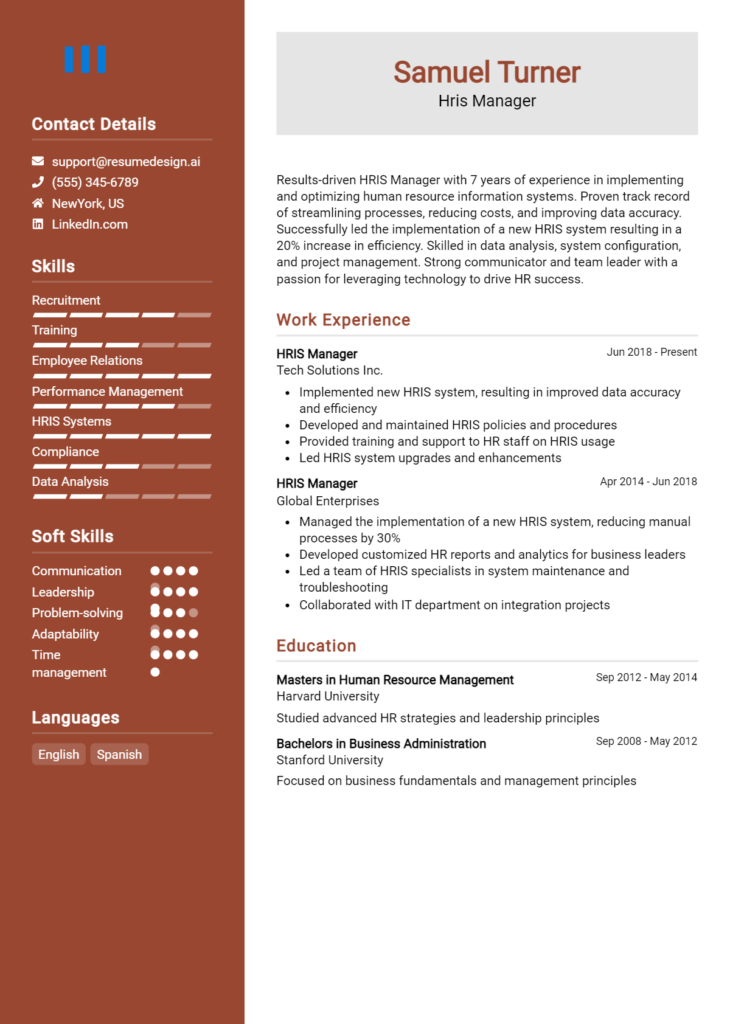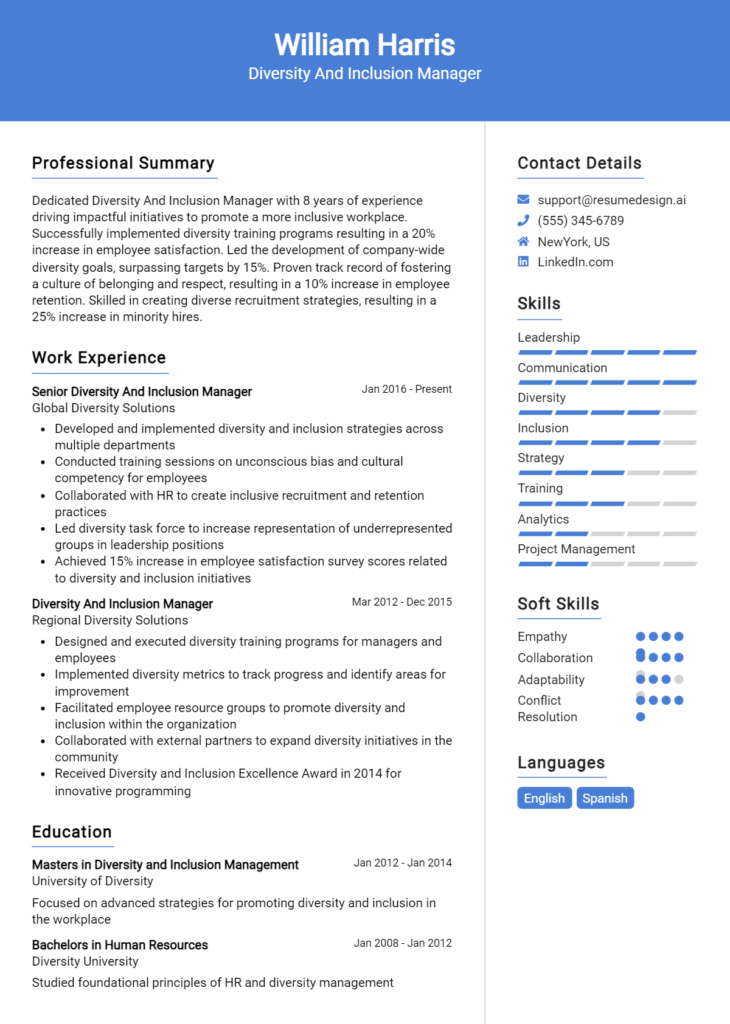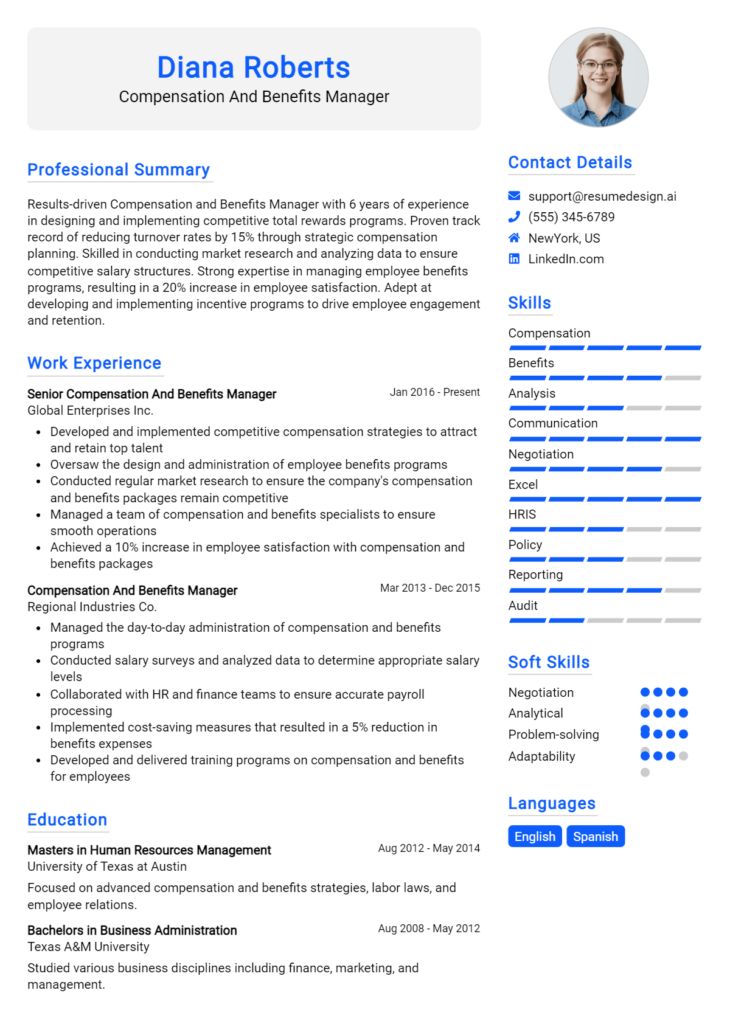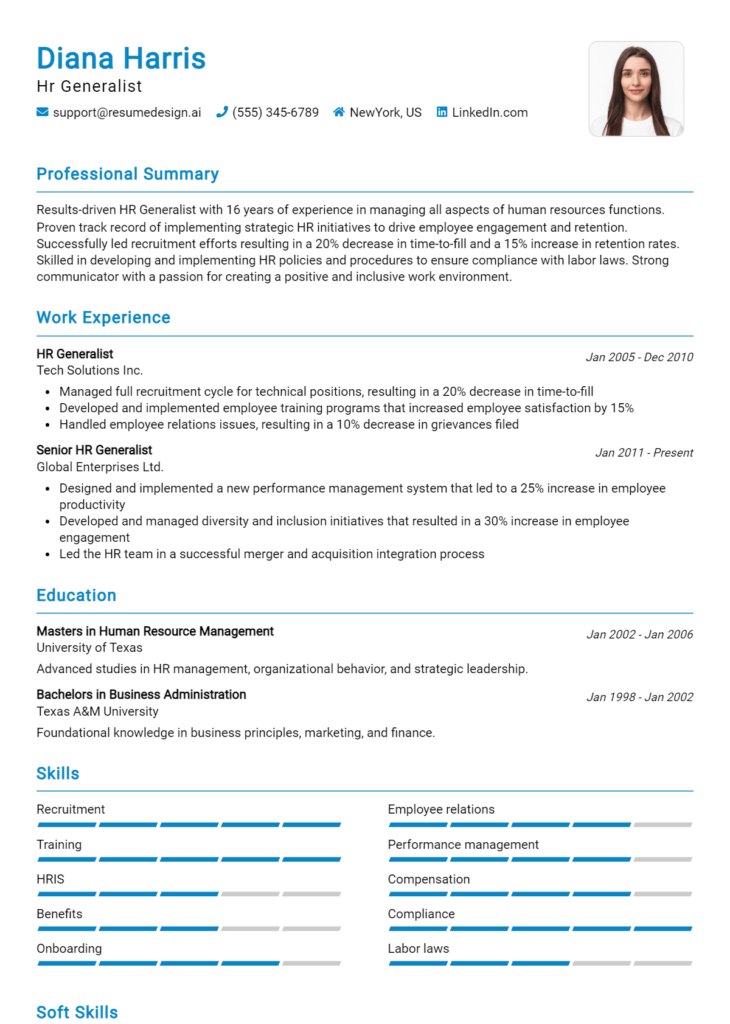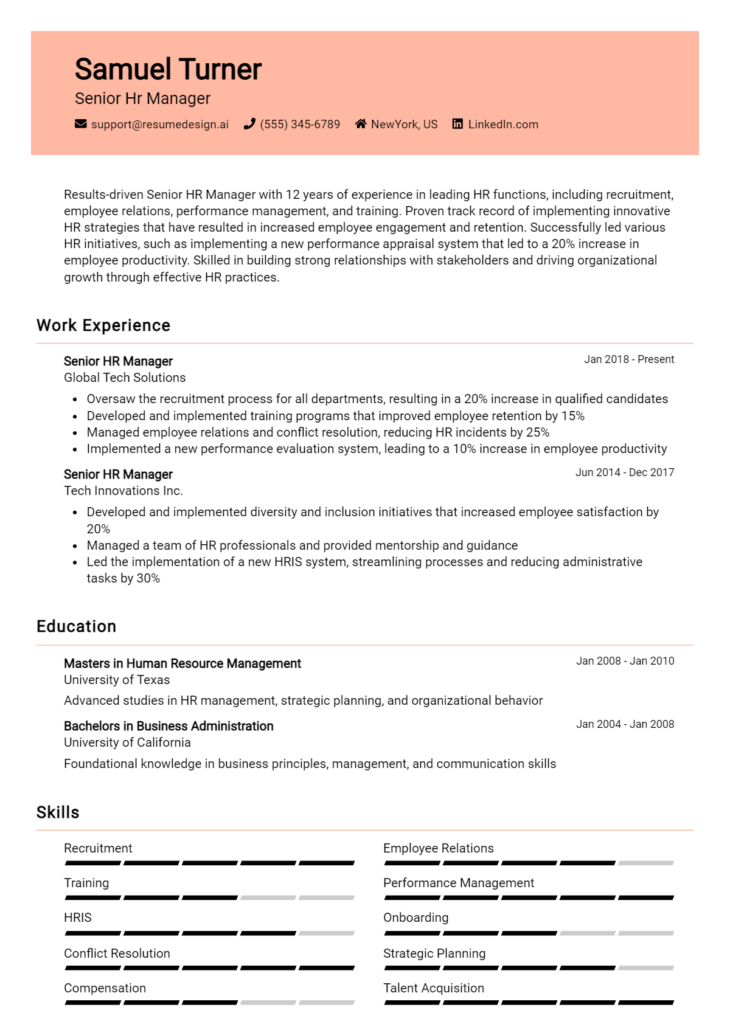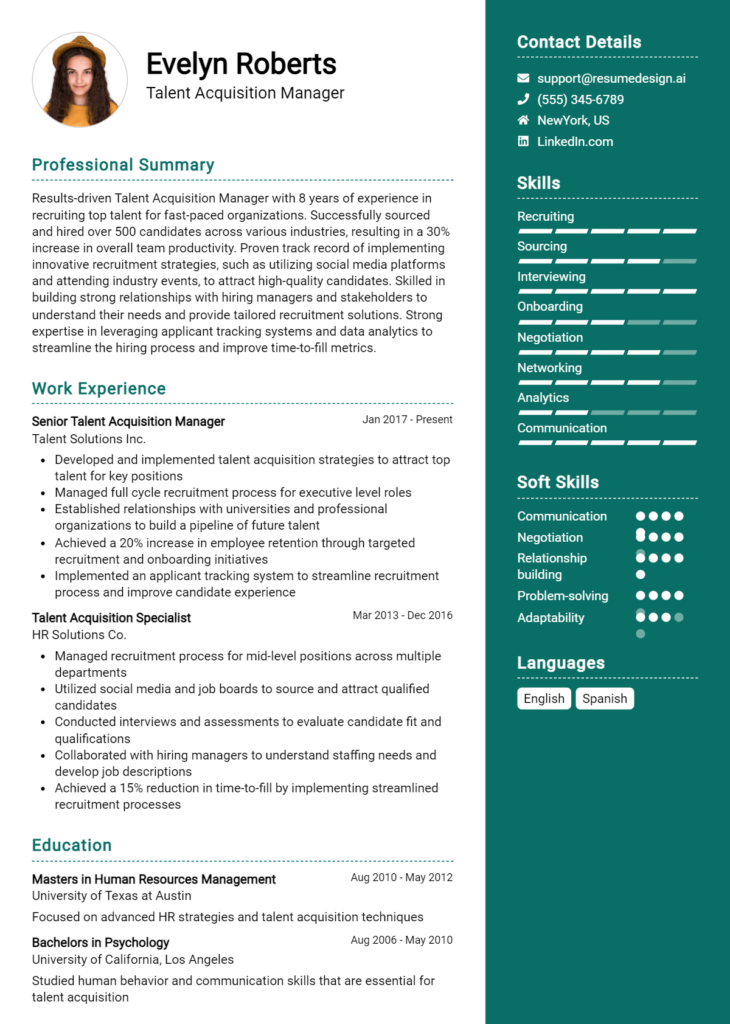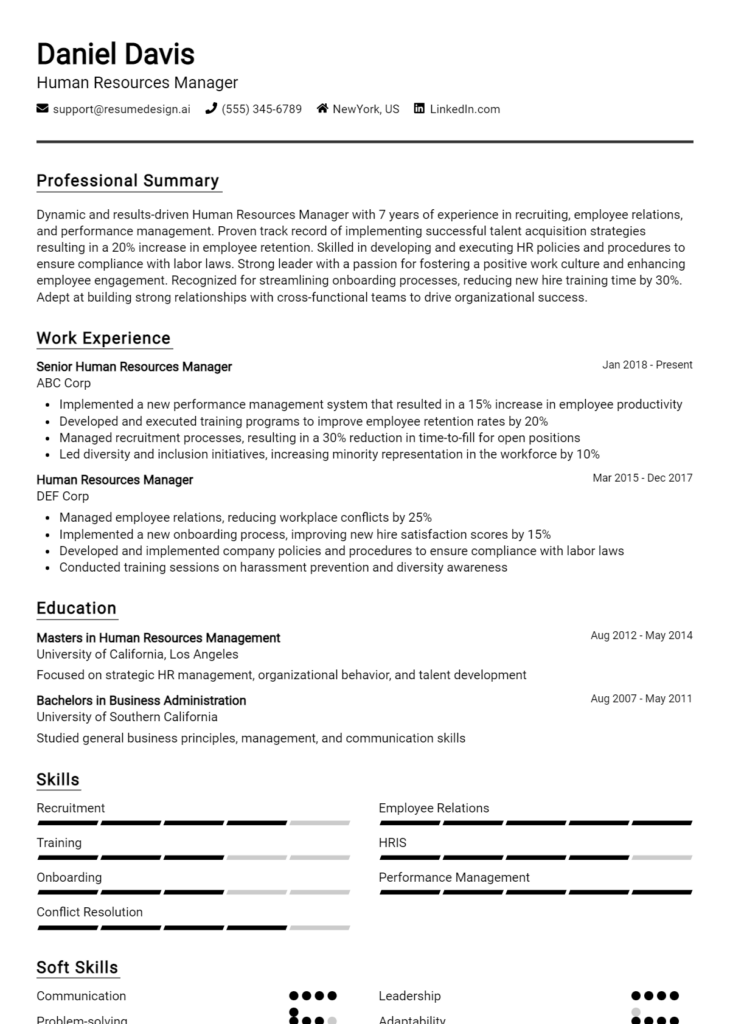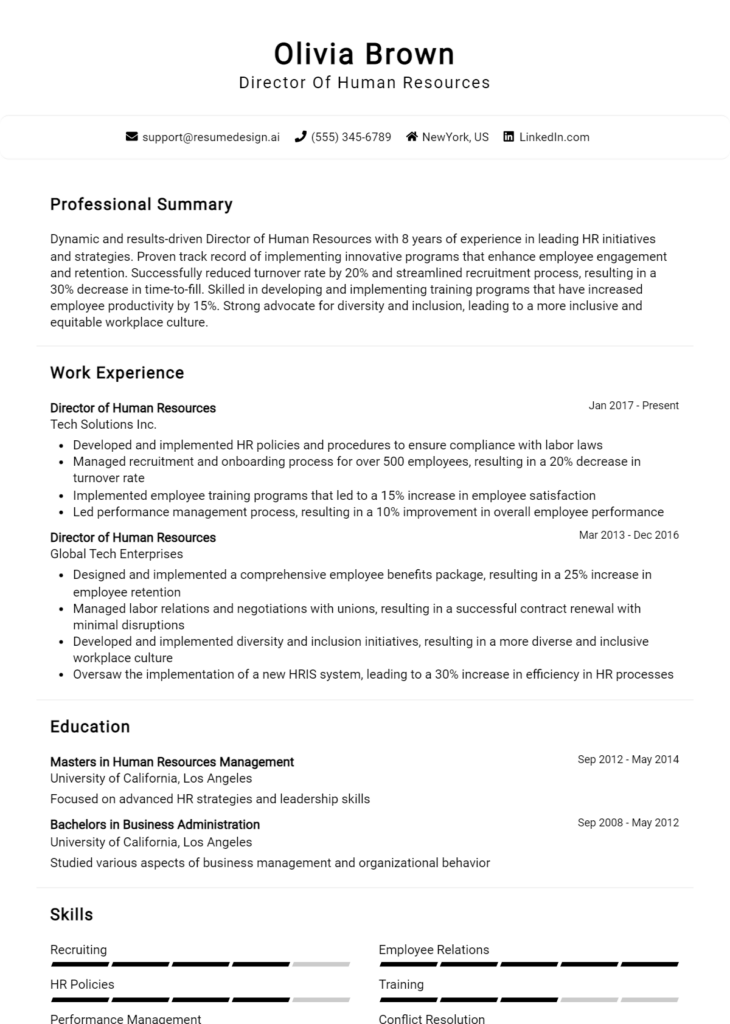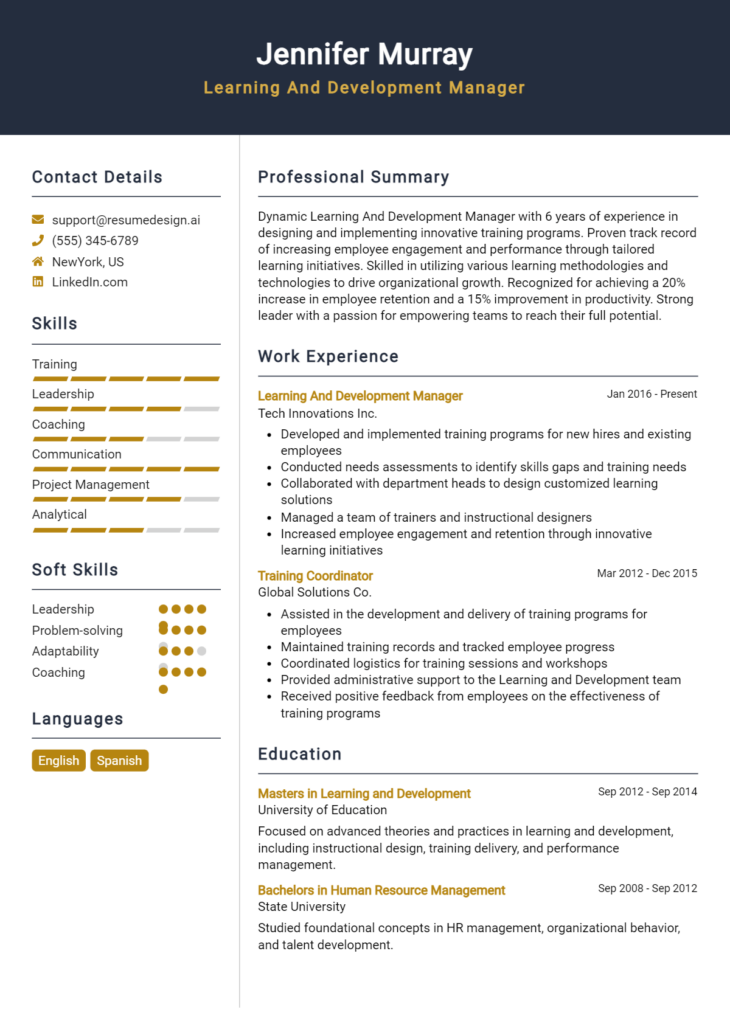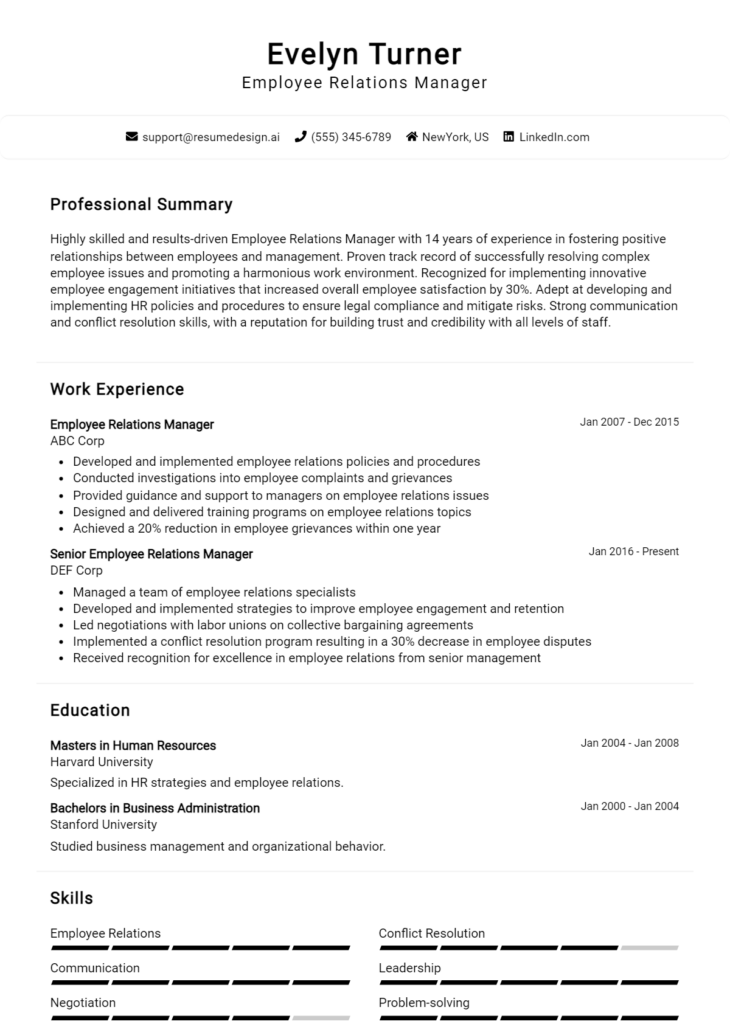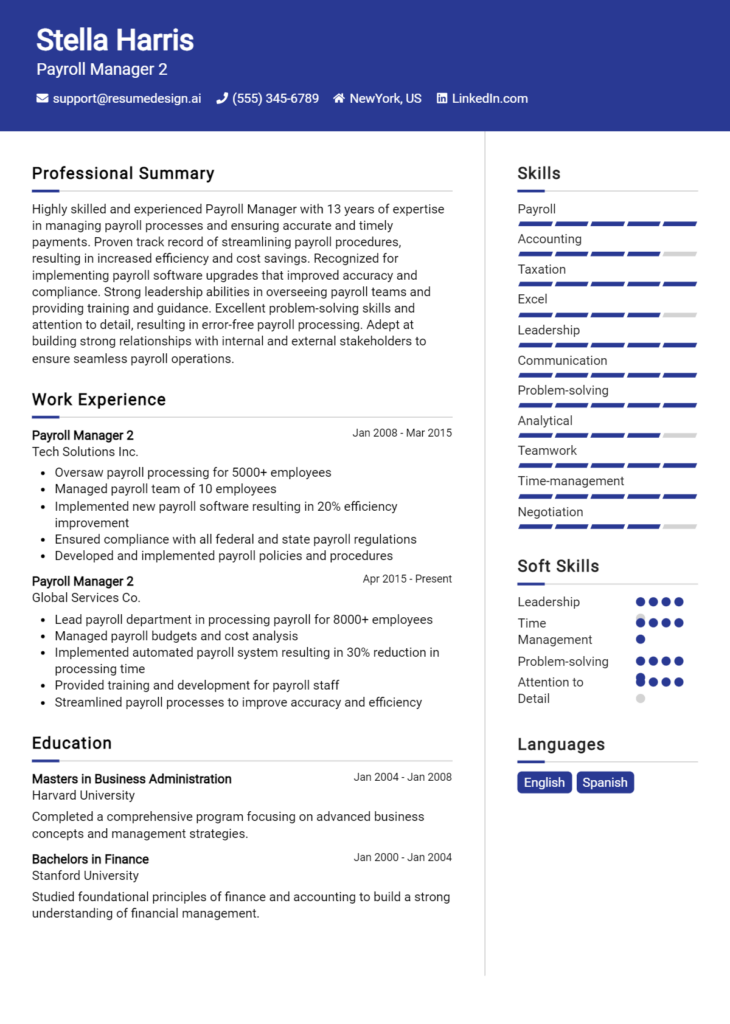Organizational Development Manager Core Responsibilities
An Organizational Development Manager plays a vital role in aligning various departments with the organization's strategic goals. Key responsibilities include designing and implementing training programs, facilitating change management initiatives, and assessing organizational effectiveness. Successful candidates must possess strong technical, operational, and problem-solving skills to navigate complex challenges. These abilities are crucial for fostering collaboration across functions and driving performance improvements. A well-structured resume can effectively showcase these qualifications, enhancing prospects for career advancement.
Common Responsibilities Listed on Organizational Development Manager Resume
- Develop and implement organizational development strategies and initiatives.
- Facilitate training programs and workshops to enhance employee skills.
- Conduct assessments to identify areas for organizational improvement.
- Lead change management processes to ensure smooth transitions.
- Collaborate with management to align departmental goals with organizational objectives.
- Analyze employee feedback to inform development programs.
- Monitor and evaluate the effectiveness of organizational development initiatives.
- Support leadership development and succession planning efforts.
- Develop metrics to measure organizational performance and employee engagement.
- Advise on talent management and workforce planning strategies.
- Foster a culture of continuous learning and improvement.
- Manage cross-functional teams to drive organizational initiatives.
High-Level Resume Tips for Organizational Development Manager Professionals
In the competitive landscape of organizational development, a well-crafted resume is more than just a document; it's a powerful marketing tool that can make or break your job prospects. For Organizational Development Manager professionals, the resume often serves as the first impression they make on potential employers. It needs to effectively showcase not only your skills and experience but also your achievements in fostering organizational growth and transformation. This guide aims to provide practical and actionable resume tips that are specifically tailored to help Organizational Development Manager professionals stand out in a crowded job market.
Top Resume Tips for Organizational Development Manager Professionals
- Tailor your resume to each job description by incorporating relevant keywords and phrases to align with the employer's needs.
- Highlight your relevant experience in organizational change initiatives, talent development, and employee engagement.
- Quantify your achievements with specific metrics, such as percentage improvements in employee retention or engagement scores.
- Showcase your expertise in industry-specific tools and methodologies, such as change management frameworks or performance management systems.
- Incorporate a professional summary at the top of your resume that encapsulates your experience and value proposition.
- Utilize bullet points for clarity and impact, making it easy for hiring managers to quickly identify your qualifications.
- Demonstrate your leadership and collaboration skills by providing examples of cross-functional projects you've led.
- Include certifications relevant to organizational development, such as SHRM or OD certification, to enhance your credibility.
- Keep your resume concise and focused, ideally within one to two pages, to maintain the reader's attention.
- Proofread your resume meticulously to avoid any grammatical errors or typos that could detract from your professionalism.
By implementing these tips, you can significantly enhance your resume's effectiveness and increase your chances of landing a position in the Organizational Development Manager field. A polished and targeted resume will not only showcase your qualifications but also demonstrate your commitment to the role, making you a compelling candidate for potential employers.
Why Resume Headlines & Titles are Important for Organizational Development Manager
In the competitive field of organizational development, a well-crafted resume headline or title serves as a critical first impression for hiring managers. This concise phrase encapsulates the essence of a candidate's qualifications, skills, and experience, immediately grabbing attention and setting the tone for the rest of the resume. A strong headline not only highlights the applicant's professional identity but also aligns closely with the specific requirements of the position being applied for. By summarizing key qualifications in an impactful way, it helps candidates stand out in a crowded job market, making it essential to invest time in creating a compelling and relevant title.
Best Practices for Crafting Resume Headlines for Organizational Development Manager
- Be concise: Keep your headline brief, ideally under 10 words.
- Use industry-specific terminology: Incorporate keywords that resonate with organizational development.
- Focus on your strengths: Highlight your most relevant skills or accomplishments.
- Tailor to the job description: Customize your headline to reflect the specific role you are applying for.
- Use action-oriented language: Begin with strong verbs or descriptors that convey your expertise.
- Avoid jargon: Ensure clarity by steering clear of overly technical language that may confuse the reader.
- Highlight your value: Emphasize what you bring to the organization rather than just your job title.
- Ensure readability: Make it easy to read and visually appealing to capture attention quickly.
Example Resume Headlines for Organizational Development Manager
Strong Resume Headlines
Transformational Organizational Development Leader with 10+ Years Experience
Strategic Change Agent Specializing in Employee Engagement and Performance Improvement
Dynamic OD Manager with Proven Track Record in Talent Development and Retention
Weak Resume Headlines
Looking for a Job in HR
Experienced Professional Seeking Opportunities
The strong headlines effectively convey the candidate's unique value proposition, highlighting specific skills and experiences that are directly relevant to the role of an Organizational Development Manager. They use powerful language and industry-relevant keywords to immediately capture the attention of hiring managers. In contrast, the weak headlines lack specificity and fail to provide any insight into the candidate's qualifications or potential contributions, making them less memorable and impactful in a competitive job landscape.
Writing an Exceptional Organizational Development Manager Resume Summary
An exceptional resume summary is crucial for an Organizational Development Manager as it serves as the first impression a candidate makes on hiring managers. A well-crafted summary quickly captures attention by highlighting key skills, relevant experience, and notable accomplishments that align with the job role. It should be concise and impactful, offering a snapshot of the candidate's strengths and suitability for the position. Tailoring the summary to the specific job description enhances its effectiveness, ensuring that it resonates with the employer's needs and expectations.
Best Practices for Writing a Organizational Development Manager Resume Summary
- Quantify achievements: Use numbers to demonstrate the impact of your work, such as percentage improvements or cost savings.
- Focus on relevant skills: Highlight specific skills that align with the organizational development role, such as change management, team building, or strategic planning.
- Tailor the summary: Customize the summary for each job application to reflect the requirements and keywords in the job description.
- Be concise: Keep the summary to 2-4 sentences, ensuring every word counts and adds value.
- Showcase accomplishments: Mention notable projects or initiatives that resulted in significant organizational improvements.
- Use active language: Employ strong action verbs to convey confidence and proactivity.
- Reflect your professional brand: Ensure the tone and content of the summary align with your overall professional image.
- Include soft skills: Don’t forget to mention interpersonal skills like leadership and communication, which are vital for the role.
Example Organizational Development Manager Resume Summaries
Strong Resume Summaries
Dynamic Organizational Development Manager with over 10 years of experience in leading change initiatives that improved employee engagement by 30% and reduced turnover rates by 15%. Proven ability to design and implement training programs that enhance team performance and align with organizational goals.
Results-oriented OD professional skilled in fostering organizational culture transformation, achieving a 25% increase in productivity through strategic talent management programs. Expertise in facilitating workshops and coaching executives to drive leadership effectiveness.
Accomplished Organizational Development Manager with a track record of implementing innovative solutions that streamlined processes, resulting in a 20% reduction in operational costs. Strong communicator adept at aligning workforce capabilities with business objectives.
Weak Resume Summaries
Organizational Development Manager with experience in HR and training. Good at working with teams.
Motivated professional seeking to leverage skills in organizational development. Experienced in various roles.
The examples of strong resume summaries are considered effective because they provide specific metrics and achievements that demonstrate the candidate's impact on previous organizations. They clearly articulate relevant skills and experiences tailored to the organizational development role. In contrast, the weak summaries lack specificity and quantifiable results, making them generic and less compelling to hiring managers. Without clear indicators of success or relevant expertise, these summaries fail to capture the candidate's true potential for the role.
Work Experience Section for Organizational Development Manager Resume
The work experience section is a critical component of an Organizational Development Manager resume as it serves to highlight the candidate's technical skills, leadership abilities, and capacity to deliver high-quality results. This section allows potential employers to assess how well the candidate can manage teams, implement effective development strategies, and drive organizational change. Quantifying achievements is crucial, as it provides tangible evidence of the candidate's impact and aligns their experience with industry standards, making a compelling case for their qualifications and suitability for the role.
Best Practices for Organizational Development Manager Work Experience
- Emphasize technical expertise relevant to organizational development, such as change management, training design, and employee engagement strategies.
- Quantify achievements with specific metrics, such as percentage improvements in employee performance or retention rates.
- Highlight collaborative projects that demonstrate the ability to work effectively with cross-functional teams.
- Use action verbs to describe responsibilities and accomplishments, showcasing a proactive approach.
- Align experiences with industry standards by using terminology and frameworks recognized in the field of organizational development.
- Include relevant certifications or training that enhance your qualifications and expertise.
- Tailor the work experience section to reflect the specific requirements and expectations of the job you are applying for.
- Showcase leadership roles and initiatives that contributed to organizational success and employee development.
Example Work Experiences for Organizational Development Manager
Strong Experiences
- Led a cross-departmental initiative that improved employee engagement scores by 30% within one year, significantly enhancing team collaboration and productivity.
- Implemented a comprehensive training program that resulted in a 25% increase in staff retention rates over two years, demonstrating effective talent management strategies.
- Facilitated workshops that equipped over 100 managers with change management skills, leading to a 40% reduction in project turnaround times.
- Developed and executed an organizational development strategy that aligned with corporate goals, resulting in a 15% increase in overall operational efficiency.
Weak Experiences
- Worked on various projects related to employee training.
- Helped in improving team dynamics.
- Participated in meetings about organizational change.
- Assisted with employee engagement surveys.
The examples of strong experiences are considered compelling because they provide specific, quantifiable outcomes that demonstrate the candidate's effectiveness in their role. They clearly articulate the impact of the candidate’s initiatives, showcasing leadership and technical expertise in organizational development. In contrast, the weak experiences lack detail and measurable results, making them less impactful and failing to convey the candidate's true capabilities and contributions to organizational success.
Education and Certifications Section for Organizational Development Manager Resume
The education and certifications section of an Organizational Development Manager resume plays a crucial role in showcasing the candidate's academic background, relevant industry certifications, and dedication to continuous learning. This section not only highlights the qualifications that align with the role but also demonstrates a commitment to professional development and the acquisition of skills that are imperative in the field of organizational development. By providing pertinent coursework, recognized certifications, and specialized training, candidates can significantly enhance their credibility and alignment with the expectations of hiring managers, making them stand out in a competitive job market.
Best Practices for Organizational Development Manager Education and Certifications
- Ensure relevancy by including degrees and certifications directly related to organizational development, human resources, or business management.
- Provide specific details about relevant coursework that showcases knowledge in key areas such as change management, team dynamics, and leadership development.
- Highlight advanced degrees (such as a Master's or Doctorate) that demonstrate a higher level of expertise and commitment to the field.
- Include industry-recognized certifications, such as SHRM-CP, PHR, or OD-specific credentials, to validate expertise and enhance credibility.
- Showcase any specialized training or workshops that relate to current trends in organizational development, such as agile methodologies or digital transformation.
- Keep the section concise and focused; avoid listing outdated or irrelevant qualifications that do not contribute to the job role.
- Use clear formatting to make it easy for hiring managers to scan and identify key qualifications quickly.
- Consider including a brief description of each certification or degree to provide context and highlight its relevance to the role.
Example Education and Certifications for Organizational Development Manager
Strong Examples
- M.A. in Organizational Development, University of Business Excellence, 2021
- Certified Professional in Learning and Performance (CPLP), Association for Talent Development, 2022
- Relevant Coursework: Change Management Strategies, Leadership in Organizations, and Team Dynamics.
- Certificate in Coaching and Mentoring, International Coaching Federation, 2023
Weak Examples
- Bachelor's in English Literature, University of Literature, 2010
- Certification in Basic Computer Skills, Local Community College, 2015
- High School Diploma, City High School, 2005
- Outdated CHRP certification, Human Resources Association, expired 2018
The examples provided illustrate the distinction between strong and weak qualifications for an Organizational Development Manager. Strong examples directly relate to the field of organizational development, showcasing relevant degrees, certifications, and coursework that align with industry needs and trends. In contrast, weak examples consist of qualifications that lack relevance to the role, such as unrelated degrees or outdated certifications, which do not contribute to the candidate's credibility in the field.
Top Skills & Keywords for Organizational Development Manager Resume
An Organizational Development Manager plays a crucial role in enhancing the effectiveness of an organization by focusing on its culture, systems, and processes. The skills highlighted in a resume are essential as they provide a snapshot of the candidate's capabilities and suitability for the role. A well-crafted resume that showcases relevant skills not only captures the attention of hiring managers but also demonstrates a candidate's commitment to driving organizational change and development. By emphasizing both hard and soft skills, candidates can effectively communicate their ability to foster a positive workplace environment while implementing strategic initiatives that align with organizational goals.
Top Hard & Soft Skills for Organizational Development Manager
Soft Skills
- Leadership
- Communication
- Change Management
- Problem-Solving
- Emotional Intelligence
- Team Collaboration
- Conflict Resolution
- Adaptability
- Strategic Thinking
- Interpersonal Skills
- Coaching and Mentoring
- Negotiation
- Decision-Making
- Time Management
- Creativity
Hard Skills
- Organizational Assessment
- Performance Management
- Training and Development
- Data Analysis and Interpretation
- Project Management
- Employee Engagement Strategies
- Succession Planning
- Talent Management
- HR Policies and Procedures
- Learning Management Systems (LMS)
- Facilitation and Workshop Design
- Policy Development
- Diversity and Inclusion Initiatives
- Compliance and Risk Management
- Budget Management
To learn more about how to enhance your skills and effectively showcase your work experience, explore additional resources that can help you stand out in the competitive field of organizational development.
Stand Out with a Winning Organizational Development Manager Cover Letter
As an experienced Organizational Development Manager, I am excited to apply for the position at [Company Name]. My background in designing and implementing innovative strategies aimed at enhancing organizational effectiveness aligns perfectly with your team’s goals. Having worked in dynamic environments, I possess a deep understanding of talent management, change management, and employee engagement initiatives, which I believe are crucial for fostering a productive workplace culture.
In my previous role at [Previous Company Name], I successfully led a comprehensive organizational assessment that identified key areas for improvement. By collaborating with cross-functional teams, I developed and executed a targeted training program that increased employee satisfaction scores by over 30% within a year. My strategic approach to performance management not only streamlined processes but also aligned employee objectives with organizational goals, resulting in a 25% increase in overall productivity. I am passionate about leveraging data-driven insights to inform decision-making and drive continuous improvement throughout the organization.
I am particularly impressed by [Company Name]'s commitment to [specific value or initiative related to the company], and I am eager to contribute to such a forward-thinking environment. I thrive in roles where I can facilitate change and support leaders to cultivate high-performing teams. My ability to build strong relationships across all levels of an organization will allow me to effectively champion initiatives that promote a culture of learning and development.
I look forward to the opportunity to discuss how my skills and experiences can contribute to the ongoing success of [Company Name]. Thank you for considering my application. I am eager to bring my passion for organizational development and my track record of success to your esteemed organization.
Common Mistakes to Avoid in a Organizational Development Manager Resume
Crafting a resume for the position of Organizational Development Manager requires a strategic approach, as it reflects not only your qualifications but also your understanding of organizational dynamics. Many candidates fall into common traps that can undermine their chances of landing an interview. By avoiding these pitfalls, you can present a more polished and compelling resume that highlights your expertise and aligns with the expectations of hiring managers in this field.
Vague Job Descriptions: Using generic terms without specific achievements can make your experience seem less impactful. Focus on quantifiable results to demonstrate your contributions.
Ignoring Keywords: Failing to incorporate industry-specific keywords can lead to your resume being overlooked by applicant tracking systems (ATS). Tailor your resume to match the job description.
Lack of Focus on Soft Skills: While technical skills are important, neglecting to showcase your interpersonal and leadership abilities can be a major oversight. Highlight skills such as communication, conflict resolution, and team collaboration.
Overloading with Jargon: Using excessive jargon can alienate readers. Aim for clarity and conciseness, ensuring your language is accessible while still demonstrating your expertise.
Poor Formatting: A cluttered or overly complicated layout can distract from your qualifications. Stick to a clean, professional format that enhances readability and emphasizes key information.
Neglecting Professional Development: Failing to include relevant certifications, training, or ongoing education can signal a lack of commitment to your own professional growth. Make sure to list these accomplishments prominently.
Not Tailoring for Each Application: Sending the same resume for every job application can be a missed opportunity. Customize your resume for each position to reflect the specific skills and experiences that are most relevant.
Omitting Metrics and Outcomes: Not providing data or measurable outcomes to back up your achievements can weaken your impact. Include statistics or specific examples that demonstrate your success in previous roles.
Conclusion
As we conclude our exploration of the vital role of an Organizational Development Manager, it's essential to reflect on the key responsibilities and skills that define this position. These professionals play a crucial role in enhancing organizational effectiveness by developing strategies that align with business goals, fostering a culture of continuous improvement, and facilitating change management initiatives. They are instrumental in assessing organizational needs, implementing training programs, and promoting employee engagement, all aimed at driving performance and productivity.
Given the competitive nature of the job market, it’s important to ensure that your resume accurately reflects these competencies and experiences. A well-crafted resume can significantly improve your chances of landing an interview. To assist you in this endeavor, consider utilizing various resources available to enhance your job application materials.
We encourage you to review your Organizational Development Manager resume and make any necessary updates to highlight your skills and experiences effectively. You can find a variety of tools to aid in this process, including:
- Resume Templates that offer professional layouts tailored for your field.
- A user-friendly Resume Builder that guides you through creating a polished resume step by step.
- Resume Examples that provide inspiration and insights into how to present your qualifications effectively.
- Cover Letter Templates to complement your resume and make a strong first impression.
Take charge of your career today—review your resume and leverage these tools to stand out in the competitive landscape of organizational development.

